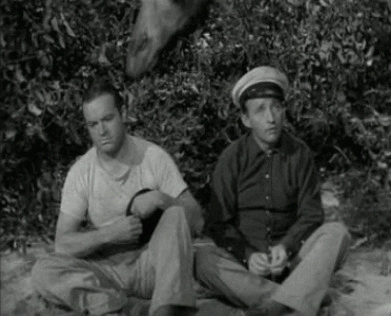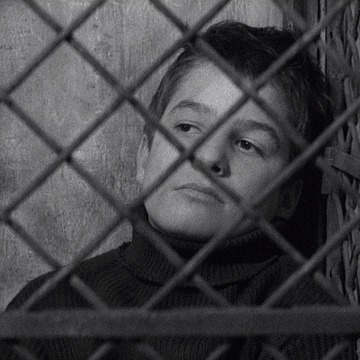Thought I’d try my hand at another of my TCM reviews, though with the recent uncertainty around TCM’s future, and also with the fact that I currently don’t have access to TCM, it does feel a bit odd. Still…
TCM has chosen an interesting way to celebrate the 4th of July—a day almost entirely devoted to musicals. It’s a good choice: it’s such an American genre, I feel, and while the Western is perhaps more so, that genre is enmeshed in two of the worst issues in American history, slavery and the dispossession and genocide of Native Americans, and even bracketing that (which is a lot to bracket) is often less “holiday” in spirit.
But the day begins (in the wee small / post witching hours) with two of the better of the Bob Hope and Bing Crosby “Road” movies: Road to Utopia and Road to Bali. If you’ve never seen one, check it out. They’re… well, dated in all sorts of ways, obviously. Not great movies, but often mentioned, some of the most popular movies of the 1940s. And interesting in other ways: they are often semi-spoofs of popular movie types of the era, not so much genres as common settings/plots, like the jungle adventure. And they are largely thin narrative wrappings around vaudeville and stage gags and routines, so also provide a small window into that world (as do Singin’ in the Rain and White Christmas).
Those are followed by two topical shorts, one on the Bill of Rights and the other the Declaration of Independence, and then the rest of the day is given over to musicals, and it’s interesting to look at the full list, which seems to have been made up of ones that TCM programmers felt were somehow particularly American:
- Small Town Girl (1953) – A sheriff’s daughter falls for a playboy arrested for speeding.
- Million Dollar Mermaid (1952) – “starring Neptune’s gorgeous daughter, Esther Williams”
- Annie Get Your Gun (1950) – Fanciful musical biography of wild West sharpshooter Annie Oakley.
- Seven Brides for Seven Brothers (1954) – When their older brother marries, six lumberjacks decide it’s time to go courting for themselves. Directed by Stanley Donen.
- Take Me Out to the Ballgame (1949) – A beautiful woman takes over a turn-of-the-century baseball team. Directed by Busby Berkeley and starring Frank Sinatra, Gene Kelly, Betty Garrett and Esther Williams (in a non-aquatic role).
- On the Town (1949) – Three sailors wreak havoc as they search for love during a whirlwind 24-hour leave in New York City. Directed by Gene Kelly and Stanley Donen and starring Kelly, Sinatra and Garrett again, as well as Ann Miller, Vera-Ellen and Jules Munshin.
- Yankee Doodle Dandy (1942) – A musical portrait of composer/singer/dancer George M. Cohan. Directed by Michael Curtiz (Captain Blood, Casablanca, White Christmas and a massive list of others) and starring James Cagney.
- The Music Man (1962) – A con artist hawks musical instruments and band uniforms to small-town America. With Shirley Jones (“The Partridge Family” and a million other things), Buddy Hackett (The Love Bug) and Hermione Gingold.
- 1776 (1972) – The founding fathers struggle to draft the Declaration of Independence. There is much more, and less, to say about this one.
Okay. You can see the “Americana” theme here, even with Million Dollar Mermaid, which is about an Australian swimming sensation, Annette Kellerman. She comes to the United States and makes it big in vaudeville and then film. Really big: her A Daughter of the Gods (1916) was the first million-dollar film production. (It’s also noteworthy for the first fully nude appearance by a major star in a US movie. Unfortunately, like most of Kellermann’s films, this is now considered a lost film, as no copies are known to exist.) So even if ostensibly about an Australian, it’s really that most quintessential American tale, the rags to riches story: little girl with damaged legs goes on to become a world class athlete and then star of stage and screen. It’s a story, a fable, America loves to tell itself.
Overall, this selection ranges from the sublime to the ridiculous. I’ve mentioned On the Town before. I consider it one of the greatest American musicals ever made. The other obvious contender for that title is, of course, Singin’ in the Rain, also directed by Gene Kelly and Stanley Donen, and to a large extent about their partnership, with Donald O’Connor playing the Donen role and Kelly as essentially himself.
So that’s the sublime end. The ridiculous is, as you might expect, 1776. I’ve seen it; if you have, too, you have my sympathies. I suppose they had to include it? And have it be the capstone of the set? Given the subject matter? Inexplicably, it has a fairly good rating on Rotten Tomatoes: 74% on the TomatoMeter and an even higher 84% audience rating. But writing in The New York Times, Vincent Canby said “[the] lyrics sound as if they’d been written by someone high on root beer,” and Roger Ebert, in his review in the Chicago Sun-Times declared, “I can hardly bear to remember the songs, much less discuss them. Perhaps I shouldn’t. It is just too damn bad this movie didn’t take advantage of its right to the pursuit of happiness.”
So the music part of 1776 would not seem to be the basis for the decent regard shown for it on Rotten Tomatoes. That really must be about the subject matter, which after all is also the reason for its inclusion in this line up. There, Canby and Ebert differed, at least a little. Canby observed (this was in 1972, on the film’s release), “it is the first film in my memory that comes close to treating seriously a magnificent chapter in the American history.” He doesn’t say it does a good job, but suggests there’s something there. Ebert, on the other hand, declared, “This is an insult to the real men who were Adams, Jefferson, Franklin and the rest.”
You can watch it for yourself if you want to judge. And it will be interesting to do so with the benefit of having Hamilton around. There, too, there are differences of opinion about the historical and biographical component, but they are much more detailed and nuanced, and benefit from a lot of good more recent historical work on the “Founding Fathers.” And the music in Hamilton doesn’t suck, even if it’s not to everyone’s taste. But be warned: 1776 is not a short film—it’s 2 hours and 21 minutes long. That’s a lot of bad music to get through (and the acting is not great either)—and that’s not even the longest cut of this movie.
Million Dollar Mermaid (1952) – on Wikipedia, and at Amazon (streaming and DVD).
On the Town (1949) – on Wikipedia, and at Amazon and the library.
1776 (1972) – on Wikipedia, and at Amazon and at the library.
If you want to learn more about movie musicals, some books you might want to check out:
Filed under: Movies, Classic Films, Film, TCM



